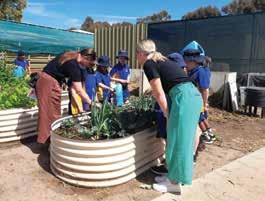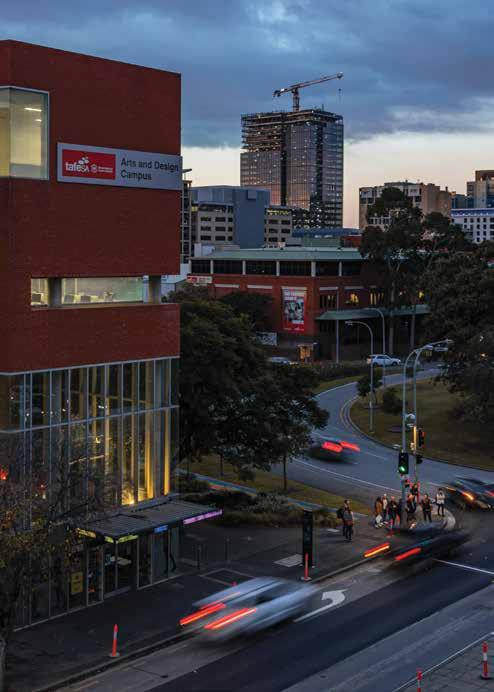
THE CRUMBLING STATE OF SA PUBLIC SCHOOLS
The damning investigation into capital funding NEW AGREEMENT, NEW OPPORTUNITIES
What the new EA means for you AN IMPOSSIBLE CHOICE
Early childhood educators balance work with wellbeing FREE







THE CRUMBLING STATE OF SA PUBLIC SCHOOLS
The damning investigation into capital funding NEW AGREEMENT, NEW OPPORTUNITIES
What the new EA means for you AN IMPOSSIBLE CHOICE
Early childhood educators balance work with wellbeing FREE







As part of our ongoing campaign for full funding, a report released by the Federal Branch of the Australian Education Union has revealed the extent of the capital divide between public and private schools.
The link between high-quality school facilities and successful educational outcomes is well established. The 2011 Review of Funding for Schooling found that, “Student outcomes are strongly influenced by the design of learning spaces and the facilities in a school.”1 Twenty-first-century learning requires safe, high-quality teaching and learning environments that cater to the diverse needs of students and equip them with the knowledge and skills required both during and following school.
Disappointingly, over the past decade, the Commonwealth Government has not fulfilled its social contract to ensure that students have access to highquality educational facilities no matter where they go to school. Our 2023 ‘State of our Schools’ survey found that almost half of principals did not have enough classroom space to meet enrolment demands over the next three to five years.
While our public schools crumble, the non-government schools Capital Grants Program has delivered $1.25 billion to private schools since 2017. The program guidelines state that it is designed to “provide and improve school capital infrastructure, particularly for the most educationally disadvantaged students”.2 However, to date, it has provided at least $42 million to schools in the top 15% of socio-economic advantageincluding Westminster School, Wilderness School, and St Peters College in South Australia.
In my former role as the Principal of Sheidow Park School, I was constantly forced to choose between dozens of pressing and necessary renovations. We replaced classroom carpets only when holes and rips became too big, always putting student spaces before worn-out staff spaces. We saw first-hand the inequity in capital works funding every day.
These findings are a stain on governments, both Liberal and Labor, not only for failing to invest in public education, but actively diverting funds toward some of our most fortunate private schools.
Whilst capital funding isn’t the only inequity negatively impacting public school kids, it’s one the Government can and must address. Because, no matter where a child grows up, they should have access to a school that gives them the best possible start in life.
SA public school investment peaked when capital investment was higher than private schools.
A sudden and sustained drop in investment, when the ratio of inequity peaked with private schools receiving 10 times the capital investment of public schools.
Public school investment increases slightly, before spiking in 2021 due to the transfer of year seven from primary to high school.
Public school capital investment was less than half (42.5%) of private school capital investment. That’s a difference of $2.17 billion.
The average annual spend per student was $949 in public schools and $2,232 in private schools.
South Australia’s private schools receive hundreds of millions of dollars a year above their recurrent funding levels as mandated by the School Resourcing Standard (SRS) developed by David Gonski.
SA public school funding is currently
In 2023, private schools received $806 million from the Commonwealth over and above what the SRS dictated they should receive.
Between 2023 and 2028, they stand to receive an additional $2.4 billion more than their SRS recurrent funding entitlement from the Commonwealth.3
Meanwhile, public schools willget nothing after this year unless the Albanese Government extends the current one-year funding program.
While public schools remain underfunded by more than $6 billion per year and have not had significant Commonwealth capital works funding for more than seven years, private schools are transferring high proportions of their income - often amounts greater than their total Commonwealth recurrent SRS funding –to elaborate building projects like orchestra pits and polo fields.
10 private schools in SA spent more on capital works ($508.5 million) than all 155 of the lowest quartile Index of Community Socioeconomic Advantage (ICSEA) public schools combined ($478.7 million).
$508.5 million
PRIVATE SCHOOL
$478.7 million
2012-21 CAPITAL EXPENDITURE
Nazareth Catholic College $51,162,529
Scotch College $33,244,728
Westminster School $51,344,685
St Peters College $62,038,760
Cardijn College $31,457,916
In addition to the obvious benefits that a well-resourced public education system has for student and educator wellbeing, there are significant economic gains to be made from adequate investment in public schools. Drawing on OECD research, capital investment in those public schools in the lowest SES quantile could help generate approximately $5.2 billion in additional growth every year over the coming eight decades. More than $100 billion in economic benefits could be generated within 20 years.4
Research from the Centre for Future Work has also highlighted the substantial long-term economic benefits of public school investment, finding that public education can be an important source of job creation, economic activity, and capital investment in Australia.5
The report finds that improvements to the school environment enhance the quality of education, allow for more tailored student support, and result in improved outcomes as measured by test scores and school completion rates.
4 Rorris, A, Investing in Schools ‐ Funding the Future, 2021 p.4
5 Littleton, E., MacDonald, F., & Stanford, J., The Case for Investing in Public Schools: The Economic and Social Benefits of Public Schooling in Australia, 2023, p.24
$2,171,720,320
Average capital expenditure per student in South Australia (2012-2021)
The number of public school students has already increased by:
ABS projects that there will be an additional 1.9 million children between 5 and 19 years by 2042.6
2015 - 2022:
The Commonwealth projects that public school enrolments will rise by a further:
160,000 2022 - 2029:
160,000
6 Australian Bureau of Statistics, Population Projections, Australia, 2017‐2066
7 Government Schools: Funded Enrolment Projections 2023 – 2029, by State (SQ23‐000357)
As educators and unionists, we have the collective power to make this happen.
Find out more and support our campaign for full funding by visiting foreverychild.au
the total additional capital investment required for SA public schools to meet private school per student funding (2012-2021).
$949
$2232
Does your school have adequate classrooms to meet current enrolment demand this year?
Do you believe you will have adequate classrooms to meet enrolment demands over the next five years?
For over a decade, public schools have been left to make do with inadequate teaching and learning environments - despite overwhelming evidence that safe, high-quality public schools are essential educational and community assets. We’re not calling for Olympic pools and polo fields, we’re calling for safe, high-quality classrooms, libraries, and learning spaces that enable educators and students to thrive.
These findings highlight the true extent of sustained and systemic underinvestment in public education over decades, and it’s up to Anthony Albanese to fix it. Despite calls from State Education Minister Blair Boyer, there is no ongoing commitment to capital funding in South Australia from the Commonwealth Government.
I stand with our Federal President, Correna Haythorpe, in calling on Prime Minister Albanese to deliver on his promise to fully fund public schools.

The South Australian Employment Tribunal (SAET) has approved our new enterprise agreement, which means you will soon receive a salary increase of at least 4% and back-pay appearing in your bank accounts shortly.
Teachers working in category one and designated special schools will begin to see an additional hour of NIT each week, and those in the country will benefit from the reinstatement of the Country Incentives Zone Allowance (CIZA).
As a result of AEU member advocacy, SSOs were paid for their first-ever public holidays in March without the need to accrue TOIL, and we look forward to working with the Department on reviewing classification structures to help more ancillary staff move up the incremental salary steps.
In stand-alone preschools, a share of $16 million has been injected into each site’s budget to help relieve directors and teachers of excessive administrative workloads taking them off the floor.
Perhaps most importantly, the new agreement contains a small but mighty new addition with Clause 5.2.6, which empowers teachers to push back against the endless pileon of ‘other duties’ during non-instruction time.
Non-instruction time is defined as “the time during school hours allocated to teachers to enable them to undertake preparation of lessons, assessment of student work, report writing and curriculum development”.

“I am delighted that we are being paid for public holidays without having to make up for it. I am also very grateful that this little gift does not take away our loading. Something like this may seem like a small thing to others, but to me, it means I am valued, counted, and heard just like all the other educators that I work with Chelle Bryant-Lee, valued AEU SSO member

+ Your new agreement* is now being implemented across the state
+ The impact of this agreement relies on members exercising your rights
+ Let’s take this opportunity to grow our strength and solidarity
The EA goes on to say, “at times it may be reasonable for teachers to undertake other duties as required by the line manager during the time allocated for NIT”.
Previously, this had enabled a broad expectation for a whole range of other duties to be completed during NIT, meaning that core preparation, planning, and assessment work was being taken home after school and completed on weekends.
The addition of new Clauses 5.2.6(a), (b), and (c) works to change that by outlining a negotiation process with the goal of agreement by the teacher to completing those other duties. It differentiates urgent and non-urgent tasks by requesting that, where possible, other duties are scheduled at times outside of NIT, allowing you to get on with your core business during the school day.
When followed correctly, this clause can be used to manage excessive workloads through a collegiate process of negotiation and agreement with line managers. However, industrial rights are only as powerful as the members who exercise them.
We can rally and demonstrate in our thousands, but our real power comes from the collective enforcement of our working rights. By doing so, we empower one another to push back against the ever-increasing demands of the bureaucracy.
Without a culture of accountability in the workplace, we enable fear, overwork, and burnout to create a perfect storm for the system that has long banked on the goodwill of educators.
If our collective demonstrations last year taught us anything, it is that we are all in this together. While it can feel lonely day-to-day, you are not alone in the challenges you face, and our collective response must reflect that.
We cannot address issues if we are afraid to raise them, and it shouldn’t be left to the next agreement before we highlight the daily realities of teaching in a classroom, supporting students, and providing high-quality educational leadership in schools and preschools.
Adequate funding underpins our ability to negotiate effective measures to fix these issues, and with the national debate taking place on bilateral school funding agreements, the Government needs to understand the weight of the pressures they are placing on you every

Download our EA2024 Implementation Pack
Familiarise yourself with what we’ve achieved together, what’s new, and what’s changing. Knowledge is power, and by learning about your rights and entitlements, you can help facilitate a harmonious, safe working environment for you and your colleagues.
Recruit one new AEU member
It’s no secret that union membership everywhere is declining. Your employer isn’t going to wake up one morning and decide to reduce your workload and increase your pay out of goodwill. That only comes through collective pressure from union members. If every member recruits one more person, we’ll be twice as strong next time.
Get active in your sub-branch
Stepping up as a union leader is a fantastic professional development opportunity, allowing you to play an important role in upholding safe working conditions for your colleagues. The best workplaces are organised workplaces, where entitlements are known, knowledge is shared, and everyone’s contribution is valued and respected. That’s what our union is all about.
day. By enforcing your entitlements in this enterprise agreement, you can help us do that.
Your union is committed to supporting every educator on this journey and we have prepared a library of resources to help guide you. We know public educators are busy so it’s our job to make unionism as accessible for you as possible.
I want to acknowledge every member who made sacrifices and stood together last year, and former President Andrew Gohl and Vice President Jan Murphy for their leadership in negotiations.
There is no silver bullet to a workforce crisis brought by years of disrespect and disinvestment. But by standing together, building our strength, and using our collective voice, this agreement will set us on a new path.
 CALLUM PENLEY, CAMPAIGN DIRECTOR, AEU SA
CALLUM PENLEY, CAMPAIGN DIRECTOR, AEU SA
KNOW YOUR RIGHTS
Visit aeusa.asn.au/ea2024 for up-to-date information and FAQs about the enterprise agreement and the implementation process.
CATEGORY 1: 2024*
CATEGORY 2: 2025
CATEGORY 3: 2026
CATEGORY 4: 2027
CATEGORY 5: 2028
CATEGORY 6 & 7: 2029

*DESIGNATED SPECIAL SCHOOLS
Some special schools which have higher IOED categories will receive the additional NIT in 2024 at the same time as Category 1 schools. These are listed below:
+ Adelaide East Special School
+ Adelaide North Special School
+ Adelaide West Special Education Centre
+ Errington Special Education Centre
+ Gordon Education Centre
+ Kilparrin Teaching & Assessment School & Services
+ Mid North Education Centre
+ Modbury Special School
+ Murray Bridge Special School
+ Port Augusta Special School
+ Port Lincoln Special School
+ Riverland Special School
+ SA School for Vision Impaired
+ The Grove Education Centre
+ Whyalla Special Education Centre
The 60-minute increase in weekly minimum NIT is due to be implemented in Category 1 schools and designated special schools* in the 2024 school year.
Whether the reduction occurs immediately following the commencement of the new agreement will depend on whether a particular site has a sufficient number of suitable teachers employed to perform the face-toface teaching required at the site.
Where a site has enough suitable teachers employed, the reduction should be implemented shortly after approval of the new agreement.
Where a site does not have enough suitable teachers employed to implement the reduction at the time the new agreement is approved, clauses 5.2.12(c) and (d) of the new agreement will apply.
In summary, the existing maximum face-to-face teaching will continue to apply but:
+ Reasonable endeavours will be made by the site leader in consultation with the PAC to reduce the workload of teachers.
+ The reduction in face-to-face teaching will apply as soon as practicable after enough suitable teachers have been employed, and no later than the next school term.
The Department is developing guidelines for sites about implementing this aspect of the new agreement.
WANT TO KNOW MORE?
Visit aeusa.asn.au/infosheet for member only, up-to-date information and FAQs.
GET INVOLVED
Visit aeusa.asn.au/ branchcouncil for upto-date information and FAQs about AEU SA Branch Council. Nominations are now open for remaining Branch Council delegate positions.
WHAT IS BRANCH COUNCIL?
WHAT DOES BRANCH COUNCIL DO?
Being part of Branch Council gives you direct access to union leaders, politicians, and policymakers. Help shape the future of public education and make a difference in our profession.
Branch Council is the highest decisionmaking body of the AEU. Branch Council determines policy and sets priorities for campaigns and advocacy.
Branch Council determines the work of the union, directs our position on important issues, and discusses pressing concerns in public education.
WHO CAN JOIN BRANCH COUNCIL?
HOW MUCH TIME DOES IT TAKE?
HOW DO I NOMINATE?
Any full member of the AEU can nominate to join Branch Council and represent their designated Area.
Branch Council meets four times per year on a Saturday. Reimbursement for travel costs and child care is available to delegates.
Branch Council is made up of delegates elected annually from local Areas, TAFE delegates elected from TAFE Divisional Council, and Branch Executive members. Area delegate elections are conducted by the Australian Electoral Commission. The number of delegates representing each Area is determined by the number of financial members in the Area. Scan the QR to learn more.
What you need to know
+ The AEU is modernising in 2024
+ We’re working to help more members connect
+ We’re adopting more contemporary technology to improve our work
2024 is proving to be an exciting year for our union.
We have a new enterprise agreement for schools and preschools, a new leadership team, a renewed commitment to securing full funding for public education across the country, and bargaining for TAFE SA is on the horizon.
We’re also working to modernise our strategies to better serve educators now and into the future. Technology will serve as a cornerstone of our modernisation as we work to improve the flow of information and connection between members and the AEU.
Currently, our Local Area Network meetings are a key opportunity for members to network beyond their site. This year, we’re utilising digital platforms to facilitate member connections. This will also allow members to inform union leadership of issues more easily in real-time.
We have new digital communities for Sub-Branch Secretaries, Women’s Contact Officers, Health and Safety Representatives, Seconded Teachers, and our committees. We’re also launching a streamlined digital space to replace PAC Chat. We know the pressures of educating can leave members feeling isolated, so these resources will help develop a stronger sense of community.

This year, you’ll notice a streamlining in our services as we upgrade our database. Our database is a repository of member information, sites, areas, the issues that prompt calls into our Information Unit, and professional learning. As our database is upgraded and the information we collect is refined, we will develop resources and target action to support members more strategically and proactively. It will also inform more targeted recruitment strategies, such as recruitment blitzes and communication campaigns.
Our efforts to better connect with you will allow us to address the issues that you face more strategically and effectively. This sophisticated approach will allow us to continue as the member-driven, democratic union we are all proud to be a part of for years to come.
 MATTHEW CHERRY, BRANCH SECRETARY, AEU SA
MATTHEW CHERRY, BRANCH SECRETARY, AEU SA
Our annual awards are back! Join us in recognising and celebrating the hard work, commitment and passion of AEU representatives and members in making public education the best it can be for colleagues and students.


Leadership doesn’t always come with a title or a formal job. For many of us, leadership was learned early in life, as we navigated our first community responsibilities. The skills I learned as the oldest of 18 grandchildren, keeping my cousins and siblings safe and entertained on our family farm, formed the basis of my leadership skills. As the Education Director of our union, I still use the skills I honed navigating the joy and risk of a farm childhood every day.
We all know courageous, strategic, and kind union leaders. Our Sub-Branch Secretary, Women’s Contact Officer, or SSO Contact Officer might be a guiding force in galvanising solidarity, a confidant, or an advocate at your site.
Our union leaders help break our overarching aims into achievable goals. Fully funding public education might start with arranging a carpool to a politician’s office. Helping every public educator become an AEU member might start with a cup of tea and a chat.
If you know an AEU member leader who embodies this definition, encourage them to attend our first annual Member Leader Conference. This could be a Sub-Branch Secretary, AEU PAC Represenative, SSO or Women’s Contact Officer, or Branch Council delegate.
FRIDAY 31 MAY | 9:30AM - 6:30PM
LEADERSHIP IS ABOUT ENABLING OTHERS TO ACHIEVE PURPOSE IN THE FACE OF UNCERTAINTY. WHEN THERE’S CERTAINTY, WHEN YOU KNOW WHAT TO DO, YOU DON’T NEED LEADERSHIP. IT’S WHEN YOU DON’T KNOW WHAT TO DO THAT THE ART AND CREATIVITY OF LEADERSHIP MATTERS.
IT MATTERS EVEN MORE IN ENABLING OTHERS TO WORK TOGETHER TO ACHIEVE A COMMON PURPOSE IN THE FACE OF UNCERTAINTY.
- Why stories matter: The art and craft of social change, Marshall Ganz
 SAM LISLE-MENZEL EDUCATION DIRECTOR, AEU SA
SAM LISLE-MENZEL EDUCATION DIRECTOR, AEU SA
All new teachers should have a mentor. Mentors should schedule time to work with their mentee. This support can be with induction, classroom observations, planning, collecting evidence or anything else you need. This year, mentors will have days of dedicated, funded release time to support you with your classroom observations. This win came from our enterprise bargaining campaign. If you don’t have a mentor, chat to your line manager or call the AEU!
+ As a new teacher, you have different rights and entitlements to more experienced educators
+ These rights are in place to give you additional support in your first years of work
+ It’s important to know your rights, so you can exercise them
It’s important to know that the full-time teaching load is lower for new teachers and cannot be averaged over the term or year. The maximum face-to-face for beginning teachers is:
Secondary school beginning teacher*
Secondary school beginning teacher ATSI*
Primary school beginning teacher*
Primary school beginning teacher ATSI*
18 hours, 54 minutes per week
16 hours, 48 minutes per week
20 hours, 15 minutes per week
18 hours per week
7 hours, 46 minutes per week
9 hours, 52 minutes per week
6 hours, 25 minutes per week
8 hours, 40 minutes per week
*If you’re teaching in a category one or special school in 2024, you will receive 60 minutes less face-to-face and 60 minutes more NIT than shown in the table above. See page 10 for more details.
Your reduced full-time load applies for a maximum total of four terms for beginning teachers employed for one full term or more within the first two years following completion of your initial teaching qualification. For most beginning teachers, this is the first year of teaching.
As a new teacher, you might be feeling overwhelmed, and our range of online and in-person training is a way to recuperate, debrief, learn, and accrue your professional learning hours. We offer free and reduced cost training year-round that counts toward your professional learning hours.
If you're feeling worried about asking leadership for release to attend training, try approaching another AEU member you trust for advice. The best thing you can do is ask early! You can also let leadership know that the AEU can cover some TRT/ travel costs for any face-to-face you miss on that day.
If your site has a leave form, you’ll need to fill this out. Consider printing the booking page to explain what the PD is about. Mark the leave as ‘special leave with pay – trade union training leave’.
 SADIE GENT VICE PRESIDENT, AEU SA
SADIE GENT VICE PRESIDENT, AEU SA
If you’re not receiving enough NIT, you don’t have a mentor, you’re worried about taking a day off or need any other support, don’t hesitate to contact our friendly and confidential Info Unit.


Are you and other members at your site passionate about sustainability? Each year, we run a round of grants to help bring environmental initiatives to life.
+ Grant 1: Up to $600 to plant native trees for a shade garden
+ Grant 2: Up to $200 to produce an edible garden for students to munch from
The AEU Environmental Sustainability Consultative Committee will award up to five schools funding for a shade garden and up to ten schools funding for an edible garden.

Do you know a brilliant teacher in their first year of work?
Let them know that AEU membership entitles them to 12 months of unlimited access to the Cool+ library of thousands of lessons and activities spanning all subject areas of the Australian curriculum V9.
APPLY TODAY
Find out more and apply at www.aeusa.asn.au/ sustainability-grants


FAR WEST
EYRE
PORT LINCOLN
SOUTHERN YORKE
UPPER SOUTH EAST
SOUTHERN URBAN
TORRENS/WESTERN URBAN
WHYALLA FLEURIEU
NATIONAL RECONCILIATION WEEK
LOCAL AREA NETWORKS Register for your closest event at aeusa.asn.au/lan
AEU MEMBER PAC TRAINING
NORTHERN NORTH WEST
MURRAYLANDS
NORTHERN YORKE
LE FEVRE
AEU MERIT SELECTION RETRAINING
AEU MEMBER PAC TRAINING
AEU
AEU MEMBER PAC TRAINING
AEU MERIT SELECTION RETRAINING
TRAINING AND PROFESSIONAL LEARNING AVAILABLE TO AEU MEMBERS
For more information head to aeusa.asn.au/upcoming
WOMEN IN LEADERSHIP DEVELOPMENT
AEU SA
SUPPORTING EAL STUDENTS
SUPPORTING STUDENTS WITH ADHD
NATIONAL CAREERS WEEK
NATIONAL WALK SAFELY TO SCHOOL DAY
NATIONAL VOLUNTEER WEEK
SOUTH EAST HILLS
NORTH
PORT PIRIE
NORTHERN URBAN / WEST URBAN
NOARLUNGA / SOUTHERN VALES
AEU SA
DIFFERENTIATION WHEN IMPLEMENTING PRIMARY LITERACY UNIT BRANCH
CENTRAL URBAN / EASTERN URBAN
PARTNERSHIPS WITH EDUCATION SUPPORT STAFF
UNION LEADER CONFERENCE
NEW UNION REPRESENTATIVES LEVEL 2
SUPPORTING STUDENTS WITH DYSLEXIA
WORLD REFUGEE DAY
AEU MERIT SELECTION RETRAINING
DEVELOPMENT PROGRAM
LEADERSHIP - CREATING PARENT RELATIONSHIPS IDAHOBIT
SUSTAINABILITY GRANTS CLOSE
STEPS TO RECONCILIATION
WOMEN’S CONFERENCE
DIFFERENTIATION FOR STUDENTS WITH A LEARNING DISABILITY
ARTIFICIAL INTELLIGENCE IN SCHOOLS
to build their union aeusa.asn.au/union-leader-conference
WOMEN’S CONFERENCE: WHAT WOMEN BUILD Come together, network, and grow in your capacity as union leaders. aeusa.asn.au/womensconference
best to ensure that all information provided was accurate at the time of printing.

“The need for action is undeniable. As they enter school, South Australian children are experiencing a concerning level of developmental vulnerability, as measured in the national Australian Early Development Census. Our children are not faring as well as their counterparts elsewhere in Australia, and these children live in families across all walks of life.”
SA State Government response to Royal Commission
+ Early childhood education is overwhelmingly female, underemployed, and casualised
+ This already vulnerable workforce will bear the load of new work and increased enrolments ushered in by the recent Royal Commission into Early Childhood Education and Care
+ We must push back on the Government taking early childhood educators for granted and demand sustainable, valued work
UPDATE YOUR DETAILS
Working in early years and want to receive our Early Childhood Update email each term?
26%
Preschool educators, like most public educators, are trying to make an impossible choice every day. They are choosing between providing the best possible care and education for our children and maintaining their own wellbeing. Preschool educators are overwhelmingly female, overwhelmingly casualised and under-employed, and paid significantly below the average Australian income.
WHILE 26% OF PUBLIC EDUCATORS ARE MALE, ONLY 2.48% OF PRESCHOOL TEACHERS AND 1.01% OF EARLY CHILDHOOD WORKERS ARE MALE.
2.48% PRESCHOOL TEACHERS
1.01% EARLY CHILDHOOD WORKERS
As educators, we know that all teaching and support staff work is undervalued. Particularly concerning is the diminished recognition for those who dedicate their days to nurturing children under five. Unfortunately, recent trends aim to fast track the qualification process for early childhood educators, potentially undermining their expertise and experience. Such actions risk compromising the quality of public preschool education and could exacerbate challenges in retaining skilled educators.
MOST EARLY CHILDHOOD WORKERS IN DEPARTMENT PRESCHOOLS ARE CLASSIFIED AT LEVEL 1. PAID ON AVERAGE BETWEEN $51,354 AND $61,384 (2022) PER YEAR FOR FULL-TIME WORK.
THE 2023 AVERAGE INCOME FOR A WORKER IN ADELAIDE WAS $70,000.
As the Vice President entrusted with advocating for our early childhood educators, I welcome many of the findings and recommendations from the Royal Commission into Early Childhood Education and Care led by Julia Gillard. I firmly believe that introducing universal three-year-old preschool has the potential to improve education outcomes for South Australian children. But as a union leader, with every positive step forward for our children and students, my attention turns to the workers responsible for bringing this political agenda to life.
The State Government has committed $56 million over four years for an Early Childhood Workforce Fund. The AEU represented public early childhood educators during the consultation stage of this fund and will continue to advocate for preschool teachers, leaders, and early childhood workers as we build a sustainable workforce strategy.
All too often we see workers blamed when government commitments fail. Yet when commitments succeed, politicians step in to take credit. When government decisions are handed down to educators, it’s the union's job to ensure that you get the support you need to manage the new work handed to you, and the recognition you deserve when you manage it with integrity and professionalism.
The Government has committed $50 million for additional preschool infrastructure and $20 million towards other Royal Commission recommendations. It is unclear how this funding will be distributed across the public and private sectors. Our public preschools must be refurbished and expanded to meet the needs of cohorts into the future. Additional toilets, changing facilities, increased floor space and dedicated staff spaces are desperately needed to lift capacity for incoming children. As public educators and union members, we must fight now to ensure the appropriate investment is made in building worldclass, public early childhood education services that meet the needs of all South Australian children.
The AEU is calling on the Government to ensure teachers, leaders, and early childhood workers are supported with time, funding, mentorship, and quality professional development to build and grow their capacity and practice.
60% $70,000 $51,354 $61,384
OF 3-YEAR-OLDS (MORE THAN 12,000 CHILDREN) ARE ALREADY IN EARLY CHILDHOOD EDUCATION AND CARE SERVICES.
AT LEAST
ADDITIONAL PLACES ACROSS SOUTH AUSTRALIA ARE NEEDED, AND OF THESE,
2000
DESIGNATED PLACES FOR OUR MOST VULNERABLE 3-YEAR-OLDS.
This year, we will continue our advocacy and engagement in the implementation process led by the AEU Early Childhood Consultative Committee, informed by a series of member roundtables across South Australia. Keep up to date with our work in this space by reading our dedicated Early Childhood Update, delivered straight to your inbox each term.
Your voice and experiences as an early childhood educator will be crucial to ensuring universal preschool receives the attention and investment it deserves.
 KENDALL PROUD VICE PRESIDENT, AEU SA
KENDALL PROUD VICE PRESIDENT, AEU SA
Amendment to Rule 21.
Delete current Rule 21.
Replace with new Rule 21.
1. Administrative Officers shall be appointed by Branch Council in accordance with this rule.
2. Administrative Officers shall be appointed for a term of 3 years commencing on 1 February next following their appointment by the Branch Council. An Administrative Officer may be reappointed for a further term.
3. Applications for the position of Administrative Officer will be considered by a Review Committee constituted by:-
(a) the Branch President or a Branch VicePresident nominated by the Branch President;
(
b) the Branch Secretary or an Administrative Officer nominated by the Branch Secretary;
(c) 3 delegates to Branch Council drawn from a pool of 4 male and 4 female delegates nominated by the Branch Council;
(d) one Equal Opportunity Representative drawn from a pool of eight persons comprising 2 men and 2 women nominated by the Status of Women Consultative Committee and 2 men and 2 women nominated by employees of the Branch.
4. A quorum for a meeting of the Review Committee shall be 4. The Chairperson of the Review Committee shall have both a deliberative and a casting vote.
5. In carrying out its duties the Review Committee may:-
(a) interview candidates;
(b) consider written material submitted by candidates; and
(c) make inquiries of referees nominated by candidates.
6. (a) A Review Committee shall provide to each member of the Branch Council its recommendations as to its preferred candidates for Administrative Officer positions at least 21 days prior to the meeting of the Branch Council convened to consider the appointment of Administrative Officers.
(b) Where a candidate for a position of Administrative Officer who is a member of the Union on the date when applications for the position close is not recommended for appointment by the Review Committee and is dissatisfied with the Review Committees' recommendation, that candidate may request that a poll be conducted at the Branch Council meeting.
(c) An application for a poll must be made to the Branch Secretary not later than 14 days prior to the meeting of the Branch Council.
(d) The Branch Secretary shall advise the Branch Returning Officer, the person recommended by the Review Committee for appointment and any other unsuccessful candidate who is a member of the Union that a poll is to be conducted at the next meeting of the Branch Council.
(e) The Branch Returning Officer shall advise all members of the Branch Council that a poll will be conducted at the next meeting of the Branch Council, advise the names of all candidates participating in the poll and distribute to each member of the Branch Council on behalf of each participating candidate a statement of not more than 200 words prepared by that candidate.
(f) The Branch Returning Officer shall prepare ballot papers which shall be distributed to delegates present at the meeting of the Branch Council.
(g) Candidates may address the meeting of Branch Council for not more than 5 minutes on their application but there shall be no debate or question time.
(h) The Branch Returning Officer shall close the poll 30 minutes after the close of the meeting.
(i) The candidate receiving the highest number of votes in the poll on a "first past the post basis" shall be appointed as the Administrative Officer.
7. Where no poll has been requested in accordance with the previous sub- rule, the Branch Council may appoint as an Administrative Officer the candidate nominated by the Review Committee.
8. (a) If an extraordinary vacancy arises in a position of Administrative Officer the extraordinary vacancy shall be filled by Branch Council in accordance with this sub-rule.
(b) Where an extraordinary vacancy occurs after a person has been appointed to fill the position but before the person appointed has taken up office, the person may take up office on a date determined by the Branch Executive and hold that office until the date on which the original appointment would have expired.
(c) Where an extraordinary vacancy occurs in other than where a person has been appointed but has not taken up the position, the extraordinary vacancy shall be filled for a term which shall expire on 31 January not less than 2 years and not more than 3 years after the date of appointment.
In order to comply with changes to the Fair Work Act 2009 (Cth) that took effect on 6 December 2023, the AEU SA Branch Executive proposes to change the AEU SA Branch rules to allow for the employment of its members’ Administrative Officers. Currently, Administrative Officers are employed on 3-year fixedterm contracts. The changes to the Fair Work Act do not allow for an organisation to employ staff on repeated fixed-term contracts, and it has been advised the exemptions in the Act are not applicable to our Administrative Officers, nor can our rules be amended to avoid doing so.
For the AEU SA Branch to comply with the Act and continue to staff Administrative Officer positions, the AEU SA must amend its rules to allow for the ongoing (permanent) employment of Administrative Officers.
This means that many of those staff that support you and that you interact with on a regular basis will have stability in their employment - something that our Union champions for all staff in schools, preschools, and TAFE.
1. Administrative Officers shall be employed or reemployed in accordance with this rule.
2. Administrative Officers may only be employed with Branch Council authorisation, except in cases of urgent pressing necessity to employ an Administrative Officer, in which case Branch Executive may authorise such employment with a limited term of 4 months or less, if such shortterm employment is lawful.
(b) the Branch Returning Officer shall give all Branch Council members ballot papers at the Branch Council meeting where the challenge and the authorisation request are considered; the recommended applicant and any challengers may address the meeting for not more than 5 minutes but there shall be no debate or question time;
(c) the Branch Returning Officer shall close the poll 30 minutes after the meeting ends;
3. The Branch Secretary shall seek Branch Council’s authorisation to employ Administrative Officers, and in doing so shall provide Branch Council with a written summary of the reasons for recommending the person’s employment as an Administrative Officer and the selection process (an authorisation request). Authorisation requests shall be provided to Branch Council at least 14 days before they are considered by Branch Council.
4. Authorisation requests must be provided to all persons who applied for the position who were Union members on the date applications for the position closed (non-recommended applicants) at least 16 days before the authorisation request is scheduled to be considered by Branch Council (the scheduled meeting). If a non-recommended applicant wants Branch Council to authorise their employment instead of the employment of the recommended applicant (a challenge), the nonrecommended applicant must notify the Branch Secretary at least 10 days before the scheduled meeting.
5. If there is a challenge
(a) the Branch Secretary must notify the Branch Returning Officer and the recommended applicant within two days of being notified of the challenge. The recommended applicant and the challenger must provide the Branch Returning Officer with any submission they wish to make to Branch Council (not more than 200 words) at least 5 days before the scheduled meeting, and the Branch Returning Officer shall notify all Branch Council members of the names of the recommended applicant and the challenger and provide any submissions received in accordance with this sub-rule to all Branch Council members at least 3 days before the scheduled meeting;
(d) Branch Council authorises the employment of the person receiving the highest number of votes in the poll on a "first past the post basis".
6. If there is no challenge to an authorisation request, Branch Council may grant the authorisation request in accordance with rule 5(1).
OPTION ONE:
PROPOSED CHANGE
Amendment to Branch Rule 3(3)(g)
Delete: “appoint”
Replace with: “authorise the Branch Secretary to employ …”
Amendment to Branch Rule Branch Rule 6(2)(g)
Delete: “(g)… or appointed as Administrative Officers;”
Amendment to Rule 6(2)(h)
Delete: “(h)… referred to in paragraph (g) of this subrule;”
Replace with: “(h) … employed by the Branch;”
OPTION TWO:
PROPOSED CHANGE
Amendment to rename Branch Rule 21
Amendment to Rule 21(1) –Delete “(1) … appointed by Branch Council …”
Replace with: “(1) … Employed or reemployed…”
Amendment to Rule 21(2)
Delete Rule 21(2)
(g) appoint Administrative Officers in accordance with the Federal Branch Rules;
(g) authorise the Branch Secretary to employ Administrative Officers in accordance with the Federal Branch Rules;
(g) determine the duties and terms and conditions of employment of persons employed by the Branch or appointed as Administrative Officers;
(g) determine the duties and terms and conditions of employment of persons employed by the Branch;
(h) terminate the employment of persons referred to in paragraph (g) of this sub-rule;
(h) terminate the employment of persons employed by the Branch;
If the alterations to amend SA Branch Rules as proposed above are not supported, the following alterations are proposed:
21 - APPOINTMENT OF ADMINISTRATIVE OFFICERS
(1) Administrative Officers shall be appointed by Branch Council in accordance with this rule.
21 - EMPLOYING ADMINISTRATIVE OFFICERS
(2) Administrative Officers shall be appointed for a term of 3 years commencing on 1 February next following their appointment by the Branch Council. An Administrative Officer may be reappointed for a further term.
(1) Administrative Officers shall be employed or re-employed in accordance with this rule.
Amendment to Rule 21(6)(a)
Delete “(6)(a) … appointment …”
Replace with: “(6)(a) … employment …”
Amendment to Rule 21(6)(i)
Delete Rule 21(6)(i) and replace with new rule 21(6) (i)
Amendment to Rule 21(7)
Delete Rule 21(7) and replace with new rule 21(7)
Amendment to Rule 21(8)
Delete Rule 21(8)(a); 21(8)(b); and 21(8(c)
(a) A Review Committee shall provide to each member of the Branch Council its recommendations as to its preferred candidates for Administrative Officer positions at least 21 days prior to the meeting of the Branch Council convened to consider the appointment of Administrative Officers.
(i) The candidate receiving the highest number of votes in the poll on a "first past the post basis" shall be appointed as the Administrative Officer.
(a) A Review Committee shall provide to each member of the Branch Council its recommendations as to its preferred candidates for Administrative Officer positions at least 21 days prior to the meeting of the Branch Council convened to consider the employment of Administrative Officers.
(i) Branch Council authorises the employment of the candidate receiving the highest number of votes in the poll on a "first past the post basis" as an Administrative Officer.
Amendment to Branch Rule 3(3)(g)
Delete “appoint”
Replace with: “authorise the Branch Secretary to employ …”
Amendment to Branch Rule Branch Rule 6(2)(g)
Delete: “(g)… or appointed as Administrative Officers;”
(7) Where no poll has been requested in accordance with the previous sub- rule, the Branch Council may appoint as an Administrative Officer the candidate nominated by the Review Committee.
(8) (a) If an extraordinary vacancy arises in a position of Administrative Officer the extraordinary vacancy shall be filled by Branch Council in accordance with this sub-rule.
(b) Where an extraordinary vacancy occurs after a person has been appointed to fill the position but before the person appointed has taken up office, the person may take up office on a date determined by the Branch Executive and hold that office until the date on which the original appointment would have expired.
(c) Where an extraordinary vacancy occurs in other than where a person has been appointed but has not taken up the position, the extraordinary vacancy shall be filled for a term which shall expire on 31 January not less than 2 years and not more than 3 years after the date of appointment.
(g) appoint Administrative Officers in accordance with the Federal Branch Rules;
(7) Where no poll has been requested in accordance with the previous sub- rule, the Branch Council may authorise the employment as an Administrative Officer of the candidate nominated by the Review Committee. (Administrative Officers may only be employed with Branch Council’s authorisation, except in cases of urgent pressing necessity to employ an administrative officer, in which case Branch Executive may authorise such employment with a limited term of 4 months or less.)
(g) determine the duties and terms and conditions of employment of persons employed by the Branch or appointed as Administrative Officers;
(g) authorise the Branch Secretary to employ Administrative Officers in accordance with the Federal Branch Rules;
(g) determine the duties and terms and conditions of employment of persons employed by the Branch;
With public education at crisis point, it's never been more important to retain great educators.
Permanency allows us to build ongoing relationships, plan for the future, and enjoy our hard-earned holidays without worrying about the next contract.
It’s time for us to come together to help every eligible educator hoping for permanency to achieve it. If you or someone at your site is looking to move into permanency, contact us.
We successfully advocate for permanency on behalf of hundreds of members every year.
AEU action last year saw record conversions to permanency for AEU members.
We have everything you need to help teachers and support staff members secure permanency at your site.
Follow the steps outlined in the Conversion to Permanency Campaign Pack and use the resources we’ve made available to you.
Head to our website to get started.
1. To be considered, contract members can:
→ check eligibility online
→ complete the relevant AEU survey and take to a sub-branch meeting
→ complete the relevant letter seeking permanency and give it to your Sub-Branch Secretary or AEU PAC Representative.
2. Sub-Branch Secretary/Rep calls a sub-branch meeting.
3. Sub-branch moves motion endorsing candidates for permanency and sends letter to the PAC to notify them.
PAC Representative collects letters from the sub-branch and individual members seeking conversion to present at upcoming PAC meeting.
Collect letters from the AEU Representative and individual members and provide them to the preschool director to support conversions at their next workgroup meeting.
The global and local stressors of the past four years have ushered in a new age of mental health crises, sharply visible in our schools. Engagement, attention, and attendance have steadily decreased. Harmful ideologies popularised by powerful influencers have rushed into the void left by time previously spent being guided by and connected with trusted, real-world adults.
Foremost among this new elite of right-wing cult figures is Andrew Tate, whose influence on young people is increasingly felt by educators and parents. Alarmingly, Tate’s name is often used by male students to harass female students and teachers in classrooms. Members consistently express fear of the damaging effect these dehumanising beliefs may have on children’s wellbeing and development. It's essential that we urgently and directly address this issue.
An ongoing study by researchers at Monash University, led by feminist researcher and lecturer in Humanities and Social Studies Stephanie Wescott, has found that women and girls in our educational institutions are feeling increasingly threatened by the growth in misogynistic views perpetuated by figures like and including Andrew Tate.
There has been a surge in sexism, sexual harassment, disrespect, and misogyny by male students, which has paralleled Tate’s growth in popularity. COVID-19 pushed more people online more of the time, creating an ideal climate for Tate and other far-right influencers to grow a captive, isolated, and vulnerable audience.
Greater investment must urgently be made in significant, practical, accessible, and sustainable mental health resources for students. This funding must include guaranteed greater access to mental health practitioners, including counsellors, who play a pivotal role in guiding students towards healthier decisionmaking, critical thinking, and coping mechanisms. This investment in student mental health must also extend to educators, who need sufficient time and support to develop strong, respectful relationships and positive role-modelling dynamics.
None of this can be achieved without dedicated funding, smaller class sizes, and improved methods to manage class complexity. We need governments to fully invest in our educational institutions, in mental health resources, and in promoting healthy role models who empower students to make informed decisions, cultivate resilience, and thrive in both their academic pursuits and personal growth.
 JAKI HEIM WOMEN'S OFFICER, AEU SA
JAKI HEIM WOMEN'S OFFICER, AEU SA
In this article
+ Since COVID-19, we’ve seen a rise in mental health issues among students
+ In the climate of increased isolation and anxiety, powerful social media influencers are spreading harmful narratives
+ These narratives are having direct, day-today impacts on students and educators
Monash University is seeking women educators to participate in this study.
If you would like to contribute, please contact Stephanie Wescott at stephanie.wescott@monash.edu.au
Please contact Women's Officer, Jaki Heim if you’d like to read the findings of the study so far.
womensofficer@aeusa.asn.au

CONGRATULATIONS VIVIAN MAH OF MARDEN SENIOR COLLEGE, WINNER OF THE 2024 JEAN PAVY AWARD FOR MERIT IN SACE STAGE II WOMEN’S STUDIES!
The annual Jean Pavy Award has been presented by the AEU for over 25 years, to public education students who receive a Merit in SACE Stage II Women’s Studies. The award honours the remarkable work of Jean Pavy, an active campaigner for public education, equal pay for women and women’s rights, and a former AEU president.
Pictured: Pene Robertson (Women's Studies Teacher, Marden Senior College), Vivian Mah, Niki Kotrotsos (Principal, Marden Senior College)
Over the past 12 months, our focus on rectifying excessive workloads for TAFE SA educators through our 21 & Done campaign has provided significant insight into the experiences of members and brought a change in attitude by the employer.
Our targeted campaign, which included a formal dispute, has highlighted your excessive workloads, the flawed TAFE operation model, and the broken new system for enrolments. As a direct result of TAFE AEU member action, the employer has now committed to working with us to design and implement an Instruction and Assessment (I&A) framework that will ensure equitable application of TAFE SA Enterprise Agreement 2022 – Part 5 Regulation of Workload across the organisation. This framework, to be implemented this year, will include training for all educational leadership staff on the proper application of our enterprise agreement.
+ The 21 & Done campaign has resulted in a commitment to workload reduction by the employer
+ The success of this campaign bolsters our ability to be strong at the bargaining table
+ Sustainable workloads are crucial for TAFE SA to flourish
The framework will ensure equitable allocation of workload duties, with particular emphasis on course coordination, resource development, student counselling, RPL & RCC assessments, quality assessments and audits, industry engagement, professional development, and program coordination duties.
The success of 21 & Done demonstrates the strength and solidarity of TAFE SA members, who will continue to play a pivotal role in enterprise bargaining negotiations later this year.
TAFE SA will see $450 million of State and Federal Government investment over the next five years. The AEU will continue to work to improve workforce conditions across the sector as TAFE is restored to being the cornerstone provider of vocational education and training in South Australia, ensuring growth, diversity, and sustainability for our state.
ANGELA DEAN
ORGANISER: TAFE FOCUS, AEU SA
The annual TAFE photography competition is back in 2024 celebrating TAFE and promoting the wonderful learning environments on our campuses across the country.
The theme of this year's competition is ‘The Heart of TAFE’ and aims to showcase the vibrant and dynamic atmosphere of TAFE. The competition is designed to encourage creativity and allows for both natural and staged photographs. Judges will be looking for entries which are both well-crafted and portray the vibrancy of life at TAFE.

Get to know our Leaders Consultative Committee, made up of leaders from across the sector. This passionate and experienced group helps shape AEU policy, support our leader members, and spearhead initiatives to make leadership roles sustainable and enjoyable.

SIMON OWENS | PRINCIPAL, PORT AUGUSTA SECONDARY SCHOOL
A great leader is someone who can recognise and develop the strengths of others. They are aware and comfortable with their leadership style, but open to feedback.
WARREN SYMONDS | PRINCIPAL, REYNELLA EAST COLLEGE
Great leadership encompasses a variety of qualities, including vision, integrity, empathy, empowerment, and adaptability that inspire, motivate, and guide individuals and groups to achieve common goals.


VINCENT PAUL | STUDENT WELLBEING LEADER, OPEN ACCESS COLLEGE
Great leadership means listening to those around you and creating space for them to excel. Helping people discover what they are capable of and helping them act on that.
SAMANTHA BROWN | HEAD OF SENIOR YEARS, MOUNT GAMBIER HIGH SCHOOL
Great leadership means building, developing, and motivating individuals and teams to set visions, directions and goals, and then working together to achieve positive and successful outcomes.


ANN CLARKE | YEAR 12 AND SACE COORDINATOR, SEATON HIGHSCHOOL
Great leadership means mentoring others to bring out their best. A great leader (which I aspire to be) creates an environment where everyone can thrive.
MATTHEW KEY | DEPUTY PRINCIPAL, MULGA STREET PRIMARY SCHOOL
Great leadership means advocating for our communities, supporting our staff, and striving for equity and fairness within our public schools.

CATHERINE CAVOURAS | DIRECTOR, TAIKURRENDI CHILDREN AND FAMILY CENTRE

Great leadership, for me, is framed by relationships that are collaborative, reciprocal, and underpinned by socially-just principles. This then provides an opportunity to co-create a culture of learning that sees children, families, and educators walking alongside each other with kindness, optimism, and agency.
GET INVOLVED
Want to contact our Leaders Consultative Committee? Email aeusa@aeusa.asn.au
We acknowledge the following additional members who make a positive contribution to the Leaders Consultative Committee, Dylan Muzyka and Jason Proud.
IDAHOBIT at Seaton High School has been a long-standing tradition, organised by our Rainbow Alliance students and facilitated by staff. Our IDAHOBIT event reminds us of our commitment to create positive change at our school and in the wider community.
The day has a great vibe, with live music and community support, we come together to raise money for LGBTQIA+ charities through an amazing bake sale.
Events like these are so important for our students. They raise awareness about the ongoing issues facing the LGBTQIA+ community and ensure our LGBTQIA+ students feel seen and supported.
IDAHOBIT is also important for our LGBTQIA+ staff. It demonstrates that educators at our site are welcoming and that LGBTQIA+ staff can feel safe within their workplace.
Days like IDAHOBIT are the perfect way to create a culture of enthusiastic inclusivity, and that benefits everyone at our school.
 SPENCER NEWMAN, TEACHER & LGBTI CONSULTATIVE COMMITTEE MEMBER
SPENCER NEWMAN, TEACHER & LGBTI CONSULTATIVE COMMITTEE MEMBER

we stand against homophobia, biphobia, interphobia & transphobia

GET INVOLVED
You can find out more and download resources at www.aeusa.asn.au/idahobit
Quick breaks that help you refocus and return to work feeling centred.
Brain teaser
A man pushes his car to a hotel and tells the owner he’s bankrupt. Why?
+ We know you work hard. So we've curated these easy stretches that you can do from the comfort (or discomfort) of wherever you're working from
+ Start by setting a phone alarm or in-between lessons, do one stretch
+ Repeat this process across the day.

Answers
Scan the OR Code to see the answers.
Hold for 10 sec
Hold for 20 sec. each side
TAILORED PROFESSIONAL LEARNING
FIGHTING FOR YOUR PAY AND CONDITIONS
A VOICE FOR ALL EDUCATORS A STRONG PUBLIC VOICE FOR THE PROFESSION MEMBER CONSULTATION ON FUNDING AND POLICIES
STANDING UP FOR PUBLIC SCHOOL KIDS INSURANCE FOR TEACHERS AT WORK
You. Teachers. Leaders. Support Staff. Aboriginal Education Workers. Early Childhood. Join the Union. TAFE. New Educators. Teachers. Support Staff. For You Childhood. TAFE.New Educators. Teachers. Aboriginal Education Workers. Join Union. Teachers. Leaders. Support Staff. TAFE. Early Childhood Workers. Su aff. Teachers. Leaders. For You. TAFE. Aboriginal Education Workers. New Educators. . Teachers. Leaders. Support Staff. Aboriginal Education Workers. Join the Union Childhood. TAFE. New Educators. Teachers. For You. Leaders. Support Staff. Aboriginal Education Workers. Early Childhood. Join the Union. New Educators Teachers. Leaders. Support Staff. Aboriginal You. Education Workers. You. Early Childhood. TAFE. New Educators. Join the union Teachers. You. Leaders. Support Staff. Aboriginal You. Education Workers. You. Early Childhood. TAFE. New Educators. Join the union. Teachers. Leaders. Support Staff. Aboriginal Education Workers. Early Childhood. TAFE. New Educators.
REGISTER TO ATTEND
The AEU holds Local Area Networks around South Australia, usually in the weeks prior to Branch Council meetings, to inform members of upcoming issues and channel member feedback to their delegates.
Your local area will comprise several schools and workplaces within your designated geographical area. Register for your local upcoming event at www aeusa.asn.au/lan
ADVERTISE WITH US:
If you would like to advertise in an upcoming edition of the Journal, email Journal@aeusa.asn.au for details and rates (where applicable).
SUBMIT A PIECE:
Do you have a story to share? Send us an email: Journal@aeusa.asn.au + Articles: maximum 400 words + Letters to the editor: maximum 200 words All submissions should be signed with name, membership status, and role description. If you would prefer to remain anonymous, please indicate this in your submission.
Access a wide range of values-based professional learning to develop your practical skills and grow as an educator.
The sessions are in real time and allow you to work with other professionals to gain insight and grow as an educator.
Differentiation when implementing a primary literacy unit
+ Thur 2 May, 4:30pm - 6pm
+ Cost: $11 for members
+ For: Members-only
In this session the presenter will focus on how you can differentiate in your literacy teaching once you have your unit plan.
Supporting EAL students
+ Thur 2 May, 4:30pm - 6pm
+ Cost: $11 for members
+ For: Members-only
Teachers who are equipped with resources and strategies to support EAL students can assist these students to overcome barriers to their learning.
Supporting students with ADHD
+ Wed 15 May, 5pm - 6:30pm
+ Cost: $11 for members
+ For: Members-only
This session will provide background knowledge about the condition of ADHD and how it typically manifests in the classroom.
Supporting students with dyscalculia
+ Thur 30 May, 4:30pm - 6pm
+ Cost: $11 for members
+ For: Members-only
In this session, the presenter will outline typical indicators of a student who is experiencing dyscalculia; some effective strategies for supporting the student in the classroom.
Building partnerships with education support staff
+ Thur 30 May, 6pm - 7pm
+ Cost: $11 for members
+ For: Members-only
In this session the presenter will share their successes and challenges when creating effective partnerships. While aimed at a teaching audience, educational support staff may also find the insights helpful.
Key Check out the AEU SA website regularly for more dates and courses at aeusa.asn.au/upcoming
Supporting students with dyslexia
+ Thur 13 June, 4:30pm - 6pm
+ Cost: $11 for members
+ For: Members-only
This session will look at dyslexia through the Response to Intervention framework and explore strategies at each of the three tiers of support.
Steps to reconciliation
+ Wed 3 July, 9am - 12pm
+ Cost: $11 for members
+ For: Members-only
As teachers, we have a unique opportunity to advance reconciliation in what and how we teach Aboriginal and Torres Strait Islander histories and cultures. The presenter will explore the issues and outline the teaching resources available for the classroom.
Middle leadership - creating positive parent relationships
+ Thur 11 July, 1pm - 4pm
+ Cost: $11 for members
+ For: Members-only
The session will set out successful practical strategies that the presenter has implemented in their school.
Differentiation for students with a learning disability
+ Fri 12 July, 9:30am - 2:30pm
+ Cost: $11 for members
+ For: Members-only
In this program, one of Australia’s leading teachers on working with students with learning disabilities will outline approaches to self-regulation and sensory processing, behavioural issues, and knowledge acquisition, experienced by those students with learning disability.
AEU merit selection retraining (School and Preschool)
+ Tue 7 May, 4pm - 6pm
+ Wed 5 June, 4pm - 6pm
+ Thur 27 June, 4pm - 6pm
+ Tue 16 July, 10am - 12pm
+ Cost: Free for members
+ For: AEU Members who wish to become an AEU Representative on panels
A two hour retraining session for AEU members who last attended merit selection training in 2018 or AEU Members who want to be an AEU Representative on merit selection panels.
AEU PAC representative training
+ Wed 1 May, 2pm - 5pm
+ Thur 16 May, 2pm - 5pm
+ Tue 11 June, 2pm - 5pm
+ Wed 26 June, 2pm - 5pm
+ Tue 9 July, 10am - 1pm
+ Cost: Free for members
+ For: AEU member PAC Representative –new and those wanting to retrain
AEU member PAC training is offered to ensure all AEU members with an interest or responsibility in school human resource matters can access, investigate, and discuss elements of the enterprise agreement and other documents in relation to PAC decisions.
Site funded.
New union representatives level 1
+ Thur 9 May - Fri 10 May, 9:15am - 3:30pm
+ Cost: Free for members
+ For: AEU members in elected positions who have not completed level 1 training previously
This hands on, participatory course works with you to ensure you know what your rights and responsibilities are as an elected union representative.
TRT vouchers and travel and accommodation support provided to eligible country members.
Union representatives level 2
+ Thur 13 - Fri 14 June, 9:15am - 3:30pm
+ Cost: Free for members
+ For: Members in elected positions (i.e. New Sub Branch Secretaries) who have completed the Level 1 training
Join us for a special two day workshop tailored to consultative union representatives, where you will enhance your skills and expand your knowledge as an elected representative.
TRT vouchers and travel and accommodation support provided to eligible country members.
SBS huddle
+ Thur 2 May, 4:30pm - 5:30pm
+ Cost: Free for members
+ For: AEU Sub-Branch Secretary and Workplace Representatives
Hear how other sub-branches set themselves up for success and what is happening this term.
Women in Leadership Development Program (WiLD)
+ Wed 10 – Thur 11 July , 9.15am - 3.30pm
+ Cost: Free
+ For: Women, non-binary, and gender-diverse members
Apply to be part of this year’s Women in Leadership Development (WiLD) course, to collaboratively create online on-demand learning modules to support the development of our Women’s Contact Officers in sites. This unique collaborative program allows you to directly contribute to supporting women in public education while growing your knowledge and skills.
Artificial intelligence in schools
+ Fri 19 July, 9:15am - 3:30pm
+ Cost: $33 to cover the cost of catering and certificate
+ For: Members-only
Get ready to dive into the future of education at the inaugural AI in Schools Conference! Join us for a dynamic and thought-provoking event where we’ll explore the ever growing power and potential pitfalls of AI in the classroom.
Women's Conference
+ Fri 12 July, 9:15am - 3:30pm
+ Cost: Free for members
+ For: Members only
www.aeusa.asn.au/ womensconference WHAT
+ Fri 31 May, 9:30am - 6:30pm
+ Cost: Free for members
+ For: Members in union leadership positions
This upcoming AEU SA conference brings together union leader members who have empowered and developed others through their sub-branch and those they represent.
TRT vouchers and travel and accommodation support provided to eligibile country members.
Read more on page 13.

Come together, network, and grow in your capacity as union leaders.
Women, non-binary and gender fluid members are invited to demonstrate how collective power and voice can make a difference in our working lives.

